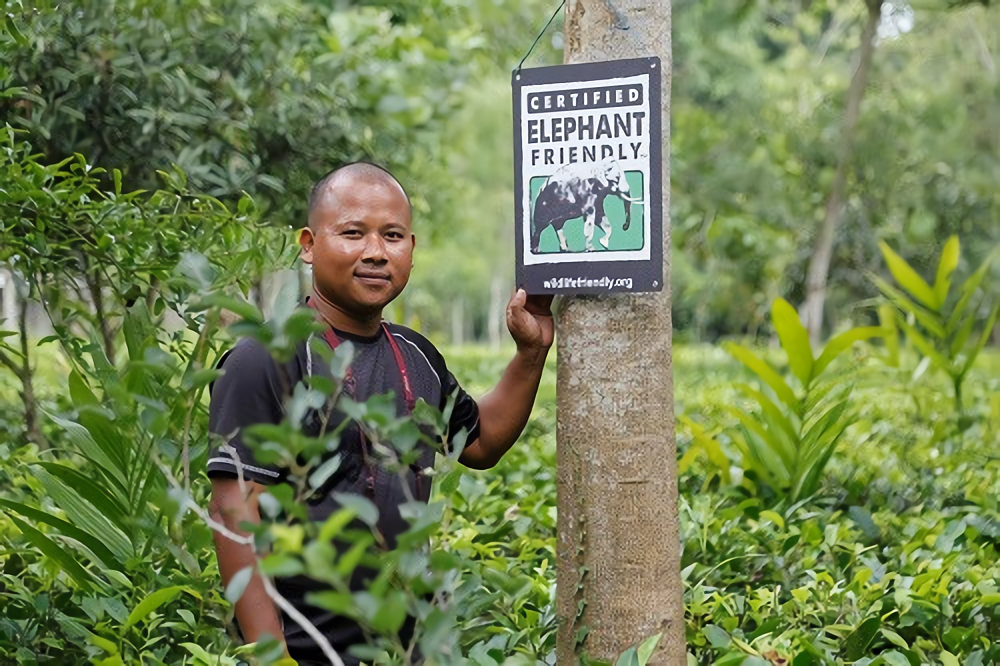Certified Elephant Friendly™ Tea farmer Tenzing Bodosa, the first small acreage farmer to be awarded this certification.
Photograph: Stephen Styris/U. Montana
There are many words you may use to describe your tea- milky, fruity, light, full. But did you ever think elephant friendly would be one of them? Here is a descriptor that you can now use thanks to a certification program by the Wildlife Friendly Enterprise Network (WFEN) and the University of Montana -Broader Impacts Group. At the World Tea Expo 2017, they introduced the world’s first Certified Elephant Friendly™ Tea grown in Assam, and since then have added another tea estate from Darjeeling. Who would have thought that elephant conservation is just a sip away?
Why Elephants?
It is a known fact that Asian elephants are endangered species. Their population has declined by 50% over the last three generations, and the numbers continue to dwindle. Factors such as loss of habitat, human-elephant conflicts and poaching contribute to this decline. Elephants now have only about 15% of their original land area to move about. These natural corridors where elephants move are essential to maintain populations and provide habitat linkages. They also support other species like the Royal Bengal tigers.
Many of the surrounding areas in these natural habitats are tea estates. Lisa Mills of the University of Montana, Broader Impacts Group had worked previously on a conservation project in the Bhutan- India border region. With the help of about 120 volunteers, Mills and her team mapped out elephant movements and mortality. They found a high number of deaths that were associated with agricultural practices, particularly in tea estates.
The issues that came to light were electrocution of elephants from power lines or electrified fencing not installed in compliance with safety standards, improper storage and use of chemicals, drainage ditches that trapped younger elephants, and human-elephant conflicts.
With the help of Julie Stein, Executive Director and Co-founder of WFEN, and expert inputs, Mills worked on turning the conservation program into a certification which could benefit tea growers and the elephant populations.
Being Elephant Friendly™
The path to becoming certified depends factors such as proper use, storage and disposal of chemicals, ensuring ditches within farmlands are enclosed, minimal fencing in elephant corridors, and addressing electrocution hazards. Elephants have known movement patterns. The certification team requests tea farms to record these movements and plan their activities accordingly- such that workers are not blocking the elephants.
While these are some of the general guidelines, the team provides a specific plan based on the existing practices of a tea farm.

The Farms
Tenzing Bodosa, the first farmer to obtain certification, approached Lisa Mills even before the program was formalized to understand how he could make his farms a better place for the species.
Similarly, Sonia Jabbar, owner of the Nuxalbari Tea Estate which is also the first large tea estate to obtain this certification, shared that her steps towards creating a safe environment for elephants began about seven years ago. In her estate, elephant conservation has a three-part approach- growing native species for elephant feed, educating children about conservation and educating the estate guards on keeping elephant corridors clear.
She is now working on setting up a compensatory mechanism for crop loss due to elephant movements, and engaging farmers from nearby areas in the conservation activities.
Jabbar and Bodosa, practice organic tea farming.
Conservation in my cup
Tea estates are now coming forward wanting to participate in this program as they slowly understand its importance. Elephant Friendly™ certification is also opening up markets for these tea growers, where consumers make conscious choices and appreciate their products.
WFEN has created certification programs for other products to support various species and raise awareness among consumers. Stein shared that the wildlife-friendly labels are quick to get people’s attention and they immediately want to know more.
The organization has been working on including wildlife in our broader dialogues about sustainability for a decade now, and the bigger challenge is making that connection obvious, Stein added. “We have an expression called “The canary in the coal mine” here in the U.S. If you send a canary down to the coal mine and it dies, you know something is wrong in the mine. If elephants aren’t thriving anymore in a place where they used to, it is important to know the reason. That’s going to tell you about the ecosystem, and how it will impact human health as well. We share the same resources and are interdependent. We are all in this together.”
This blog was originally published on January 24, 2019, in Nature inFocus.
For more information, visit: Elephant Friendly™ Tea and the Wildlife Friendly Enterprise Network.


